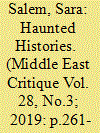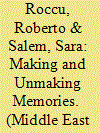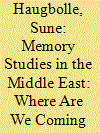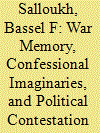|
|
|
Sort Order |
|
|
|
Items / Page
|
|
|
|
|
|
|
| Srl | Item |
| 1 |
ID:
167655


|
|
|
|
|
| Summary/Abstract |
Trapped in the premises of the transition ‘paradogma,’ democratization and authoritarian persistence literature are limited by a linear and continuous understanding of time, a gradualist view of transition, and a procedural definition of democracy. These analytical and normative strictures are compounded by a methodological nationalism that prevents an appreciation of how global factors shape the parameters for political transformation in the contemporary Middle East. Inspired by Gramsci’s theory of history, this article seeks to move beyond these limitations and explore the prospect of transition as rupture, away from democratization as strategy for ensuring duration of capitalist time, and toward democratic transition as epochal change beyond capitalism. By counterposing the effects of the two globalizations and the decolonization in between on the prospects of political transformation in the Middle East, this article argues that the Arab uprisings provide an opportunity for thinking globally and rupturally about political time, transition and democracy in the region.
|
|
|
|
|
|
|
|
|
|
|
|
|
|
|
|
| 2 |
ID:
167660


|
|
|
|
|
| Summary/Abstract |
Afghanistan appears to exist in a different time from ‘us.’ Modernization theory, linear narratives of progress, teleological tales of growth and common sense stories of development seem to have met their match when it comes to this landlocked country. This paper considers the ubiquitous construction of Afghanistan as the ‘Graveyard of Empires’ to explore the ways in which representation, memory-making, and an allegory of mythic import perform a constitutive function and help suture an otherwise disjointed history of Afghanistan. Conducting a sustained inquiry into the political valence of the Graveyard trope, the paper reveals that it is especially ill-chosen on three counts. (i) It is ahistorical, relying on a selective evocation of history. Related to this ahistoricism, it sets up the past as the ‘key’ to understanding the Afghan present. On this account, another future is not possible. (ii) It is geographically or at least ‘physically’ deterministic: Afghanistan is constructed as a land of unconquerable terrain, its topography menacing and ultimately unassailable. Not only does this present the physical environment as an immutable entity, it also feeds into representations of Afghans as rugged warriors, bred to be weathered and connately austere. (iii) It is racialized: Afghans as inhabitants, creators and living relics of this graveyard are constructed as inured to hardship, belligerent and always already girded for combat. Thus the ‘graveyard of empires’ becomes a politically charged trope that is engaged in a continual re-inscription of the Afghan population as an alien other.
|
|
|
|
|
|
|
|
|
|
|
|
|
|
|
|
| 3 |
ID:
167657


|
|
|
|
|
| Summary/Abstract |
This article revisits the Nasserist project through the lens of haunting. It explores the afterlives of Nasserism, in particular in relation to Egypt’s move toward a free market economy from the 1970s onwards. To do this, I explore the Nasserist project in order to excavate some of the promises that were made and to trace the legacies these created. I argue that both these promises—only partially fulfilled—and the social violence they at times contained—continued to act as powerful political memories that limited Egyptian politics in the decades that followed. Thinking of Nasserism as a form of haunting allows for a deeper understanding of how different political projects seep into one another, problematizing the notion of a linear teleological or providential trajectory consisting of distinct eras. In distinction to work that has mobilized the concept of haunting (originally theorized by Jacques Derrida) in order to elaborate on the historical manifestation of damaging or violent legacies in the present, I argue that Nasserist forms of haunting should be read as both a productive and destructive normative force in the present. This article puts forward examples of both, particularly in relation to questions of social justice, socialism, and anti-imperialism.
|
|
|
|
|
|
|
|
|
|
|
|
|
|
|
|
| 4 |
ID:
167654


|
|
|
|
|
| Summary/Abstract |
Memory-making and the use of memory is always political, and more visibly so in times of crisis, conflict and transition. The current situation in the Middle East and North Africa is no exception to this, where we have seen history, and specific narratives stemming from it, being mobilized toward certain political goals. In taking time as a distinct analytical category, this special issue aims to show that its explicit consideration transforms the ways in which we understand current political dynamics in the Middle East and North Africa. Both memory and time can be illuminating in drawing connections between the political, the economic and the social, thereby shedding new light on old conflicts on the one hand, and bridging the gap between the political and the social/cultural on the other.1
1 Alon Confino (1997Confino, A. (1997) Collective Memory and Cultural History: Problems of Method, American Historical Review, 102(5), pp. 1386–1403.
[Crossref], [Web of Science ®] , [Google Scholar]
) Collective Memory and Cultural History: Problems of Method, The American Historical Review, 102(5), pp. 1386–1403.
View all notes
As Charles Tilly noted, the politics of memory can tell us about both shared historical experiences and their effects on politics today, as well as the contestation or coercion over interpretations of the past—and present.2
|
|
|
|
|
|
|
|
|
|
|
|
|
|
|
|
| 5 |
ID:
167658


|
|
|
|
|
| Summary/Abstract |
This article takes stock of the field of memory studies and where it has moved since the Arab uprisings. If the 1990s marked the first interest in memory studies, the 2000s opened the floodgates to a variety of approaches and localities. The aim is not to present a complete catalogue of memory studies in the Middle East, but rather to highlight some of the trends and patterns in the field and its development over time. It does so both by discussing key works and by focusing on an examination of memory studies about contemporary Lebanon. The article argues that memory studies in the 1990s drew on a particular understanding of transition that came to an abrupt end with the Arab Uprisings. 2011 marked a turning point both in the way the uprisings made scholars question the national framework previously privileged, and by stoking an interest in memories and histories of revolts other than those connected to the anti-colonial struggle. The latest wave of memory studies investigates the uses of online archives and the archive as metaphor for how storage functions for human memory, introducing new methodologies and theoretical directions.
|
|
|
|
|
|
|
|
|
|
|
|
|
|
|
|
| 6 |
ID:
167656


|
|
|
|
|
| Summary/Abstract |
This article re-examines Third Worldism as a political ideology, with a specific focus on a number of Algerian intellectuals. By taking Algeria as a privileged locus of investigation, the discussion zooms into a specific context of Third Worldism, the Algerian War and the decade after, therefore focusing on the period between the 1950s and the 1970s. Here I understand Third Worldism to mean more than the instantiation of the postcolonial state through anticolonial liberation struggles. Rather, I take into consideration (Algerian) voices that push against the rigid boundaries of methodological nationalism and postcolonial theory. By embracing the ethos of ‘affirmative critique,’ the analysis aims to bring to light those ‘forgotten, hidden or invisible acts of critique’ that expose under-currents of Third Worldism not usually discussed or engaged. Thus, I engage writings of rarely considered Third World intellectuals, such as Kateb Yacine, Jean Amrouche, Jean Senac. These are all Algerian intellectuals; the reason behind this focus is the following: their involvement in Algeria’s decolonization struggles translated into translocal solidarity with other decolonization projects, whether in Vietnam or in Palestine. Aside from gesturing toward a translocal spatiality, their writings also embody a more genuine retrieval of dignity by the colonized, and an alternative memory of a different Algerian nation, intrinsically plural and hospitable to difference. Put differently, these voices both attempt a kind of diagnosis (however partial and incomplete) for the reductionism into which the Third World liberation state (inevitably) fell, while suggesting an alternative political horizon that comes closer to Fanon’s idea of ‘national consciousness’, especially in its attention to the ‘international dimension.’1
|
|
|
|
|
|
|
|
|
|
|
|
|
|
|
|
| 7 |
ID:
167659


|
|
|
|
|
| Summary/Abstract |
The Israeli right—an alliance of neoliberal parties and settler organizations—has become the undisputed and seemingly undisplaceable political leadership of the state over recent decades. This transformation has been associated, both in Israel and internationally, with successive Likud-led governments in general, and their allies within the settler movement. A recurrent theme within analyses of this rise is the claim, made by journalists, academics and activists alike, that fascism is rearing its head in Israel, both in government and on the streets. This article argues that an analysis of Israel’s Labour Zionist history and confronting the claims made by its contemporary supporters, in the face of the Zionist right’s dominance, in fact highlights long-term political continuities and undermines claims of rising fascism. By building on critical literature on the politics of memory, this paper further discusses how a romanticized vision of the past, is central to current attempts by Labour Zionism to re-organize itself while whitewashing its own history. Finally, this article shows that a focus on history, and an analysis of the construction of collective memory, uncovers the ways in which the contemporary Zionist right has emerged from the foundations built by Labour Zionism itself.
|
|
|
|
|
|
|
|
|
|
|
|
|
|
|
|
| 8 |
ID:
167661


|
|
|
|
|
| Summary/Abstract |
This article investigates how commemorating practices are deployed to fix and affirm sovereignty and its ordering. Through conceptualizing commemorating practices as ‘national symbolic order’, this article focuses on Cairo’s monument of the Unknown Soldier as a tangled cluster of shifting attempts to signify urban space. Built shortly after the 1973 war, the monument expressed an approach to nationalist symbolism that was in line with how the Sadat regime came into its own because of the war. The article traces the influences on the style of the monument and the narrative of its construction. Ironically, six years later, the same monument became the resting place of Sadat after his assassination on the same site. How is urban space implicated in the construction of a national symbolic order? How is politics as death and mortality navigated and scripted in city space? In answering these questions, the article relies on interviews with the designer of the post-independence Monument of the Unknown Soldier conducted in 2015 and 2016, and his photographic collection. It proceeds in four sections discussing the significance of the October war of 1973 in shoring up the legitimacy of Sadat, imagining the monument, constructing the monument and, finally, the monument’s mediation of death and sovereignty. From the materiality and entanglements of one site, the article analyzes ‘state-making’ via ‘city-making’ after 1952 and well into 1970s. Ultimately, it follows the hesitations of deploying a national symbolic order in post-independence Egypt and of attempts at shoring up a shaky state apparatus in a common political space.
|
|
|
|
|
|
|
|
|
|
|
|
|
|
|
|
| 9 |
ID:
167662


|
|
|
|
|
| Summary/Abstract |
How does sectarianism intersect with war memories to subvert the political balance of power in postwar Lebanon? This article examines this complex dynamic along two levels. On one level, it demonstrates how war memory is deployed selectively from above by members of the political elite to sabotage the national war memory sanctioned officially and corresponding to a particular postwar confessional balance of power. At another level is the confessional or sectarian use of memory to resist this postwar political balance of power perceived as unjustly tipped against the subnational community. The argument advances in two steps. I first examine how war memory is invoked during crucial political battles that impact the postwar confessional balance of power. I take the debate around the promulgation of a new electoral law, and the 2018 parliamentary elections, in the context of the regional repercussions of the explosion of the Islamic State in Iraq and Syria (ISIS) and the spillover effects of the Syrian war on Lebanon, as a case study of how different elites not only invoke war memories to contest or defend the postwar confessional balance of power but also to advance intra-sectarian political prerogatives. I then consider political memory as part of a complex and variegated confessional imaginary that survives at the private level in the form of resistance by substantial sectors of the Christian community to the postwar political balance of power and to the official national narrative of the war, one that refuses to revisit some of its most sordid moments, namely, its massacres. The article closes by underscoring the importance of reconciling dissonant memories of the war as a prerequisite for achieving genuine justice, peace, and reconciliation in postwar Lebanon.
|
|
|
|
|
|
|
|
|
|
|
|
|
|
|
|
|
|
|
|
|